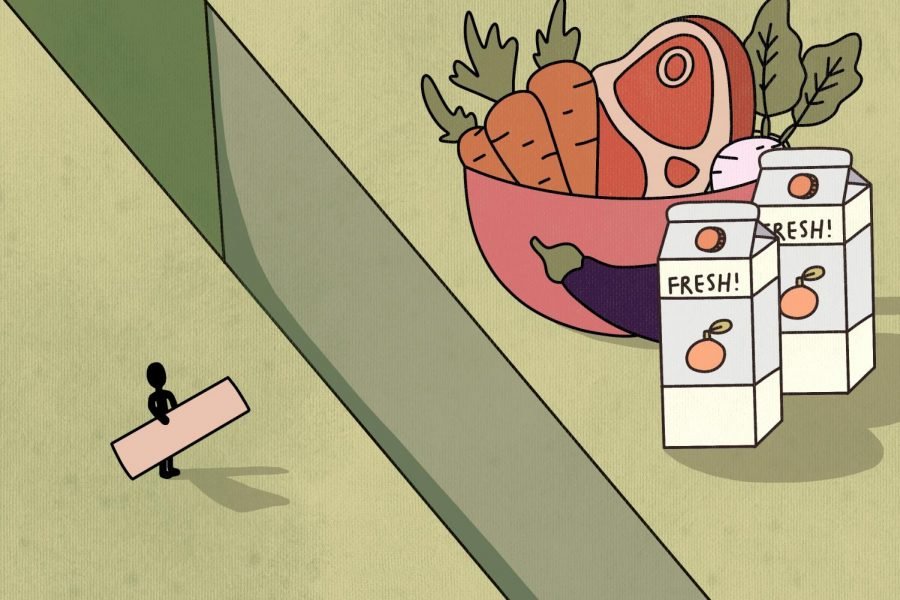ETHS senior Jacob Brodsky shares results of city urban agriculture survey
Despite initiatives to increase food accessibility in Evanston, some residents still lack access to affordable, fresh food. ETHS senior Jacob Brodsky’s survey laid out preliminary plans to address the food disparity within the city.
May 7, 2021
Evanston Township High School senior Jacob Brodsky presented solutions for local food insecurity that he gathered from his city urban gardening survey in a Thursday afternoon presentation.
As part of his independent study class presentation, Brodsky delivered his results to community members, including 4th Ward alderperson-elect Jonathan Nieuwsma, 5th Ward alderperson-elect Bobby Burns and Joel Freeman, a board member of Citizens’ Greener Evanston and co-chair of Evanston’s Climate Action and Resilience Plan.
The survey focused primarily on urban agricultural solutions residents were looking to implement, and guided Brodsky’s presentation. His slideshow suggested respondents’ input had a common theme of creating “a more resilient food system that isn’t as dependent on large scale operations” — something he said is currently the norm.
The urban agriculture initiatives he laid out ranged from incorporating food-bearing plants on parkways and in parks to integrating urban agriculture into schools. A crucial part of his plan is implementing municipal policy that allows expanded planting in public places.
“Our current food system has a supply chain — it’s too long, which allows for many more problems to happen along the process of distribution,” Brodsky said. “Because of this farmers have to dump milk and let vegetables rot. At the same time, there were record food bank lines across the country (during the pandemic).”
While schools are a great place for gardens, parents typically run those gardens, Brodsky said. That means there is frequent turnover and minimal consistency with who is available to run the garden from year to year.
The solutions Brodsky presented are part of a larger movement, which he hopes will bring about justice for marginalized communities.
“Environmental justice and climate action are intertwined,” Brodsky said. “We cannot equitably make a transition to a more sustainable society without addressing food injustice.”
To manage all urban agriculture projects throughout the city, Brodsky proposed the creation of a city gardener position, who would share some of the city arborist’s responsibilities while allowing both to specialize in their own areas.
After detailing his findings in the presentation, he opened up the program for community members to ask questions.
In response to a question from Nieuwsma about which policies the city should pursue, Brodsky said allowing raised beds on parkways and facilitating access to food-growing public programs would empower residents to consume healthier food with smaller impacts on the environment. The latter, he added, is especially important in food deserts or communities with minimal access to community gardening opportunities.
Burns said he is excited to begin working on urban agriculture as an alderperson, and securing the city’s first “win” within the new administration.
“Working to establish an urban agriculture committee at the city of Evanston is something I feel very strongly about working towards so we get our first win there,” Burns said.
Nieuwsma joined in, saying he “motions a second” affirmation in response.
Freeman said the hard part about urban planning is finding ways to utilize “unused space,” or open areas not actively being cultivated, throughout the city. He also commended Brodsky for coming up with concrete solutions.
“Sometimes it’s hard for us to envision all this kind of unused space and a lot of areas, so that’s good to have that kind of accounting done for,” Freeman said.
Both Brodsky and Freeman said gardening is a good way to manage public spaces, provide food supply and maintain a healthy local ecosystem.
Gardening is a popular pastime for many residents, Freeman said, and volunteers are a great way to put plans into action while building upon the goals CARP has laid out.
“We would convene a committee on urban agriculture, because it would create a space for all these volunteers that might want to help all the different community gardens,” Brodsky said. “They would be a way to share ideas and get involved.”
Email: [email protected]
Twitter: @nick24francis
Related Stories:
— ETHS senior conducts survey to address Evanston food accessibility


